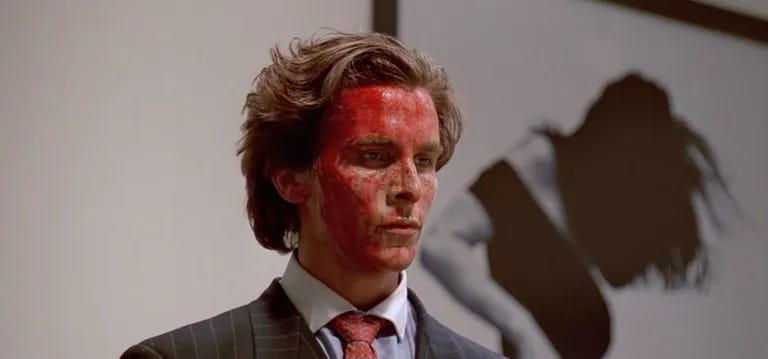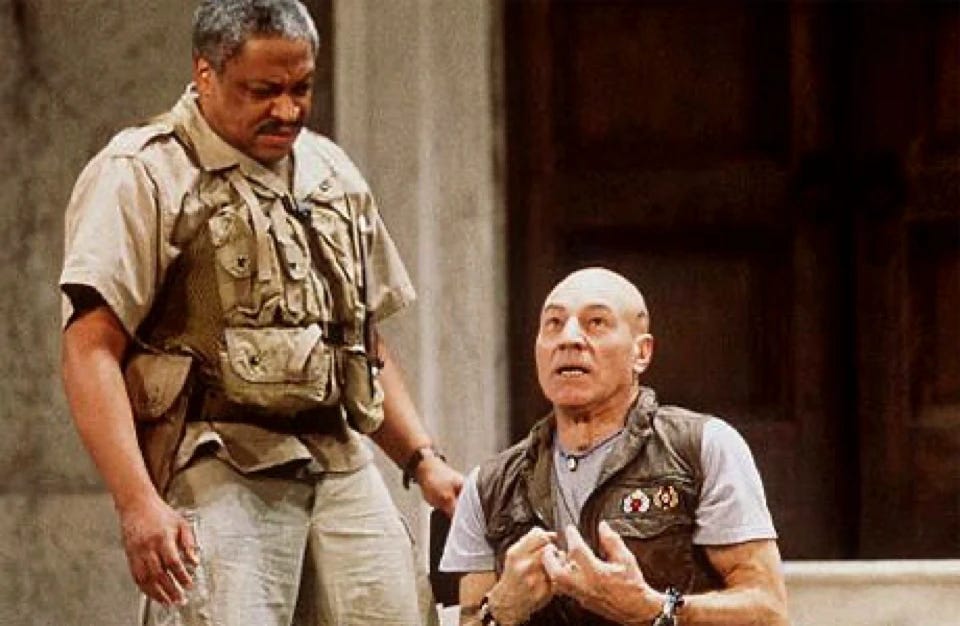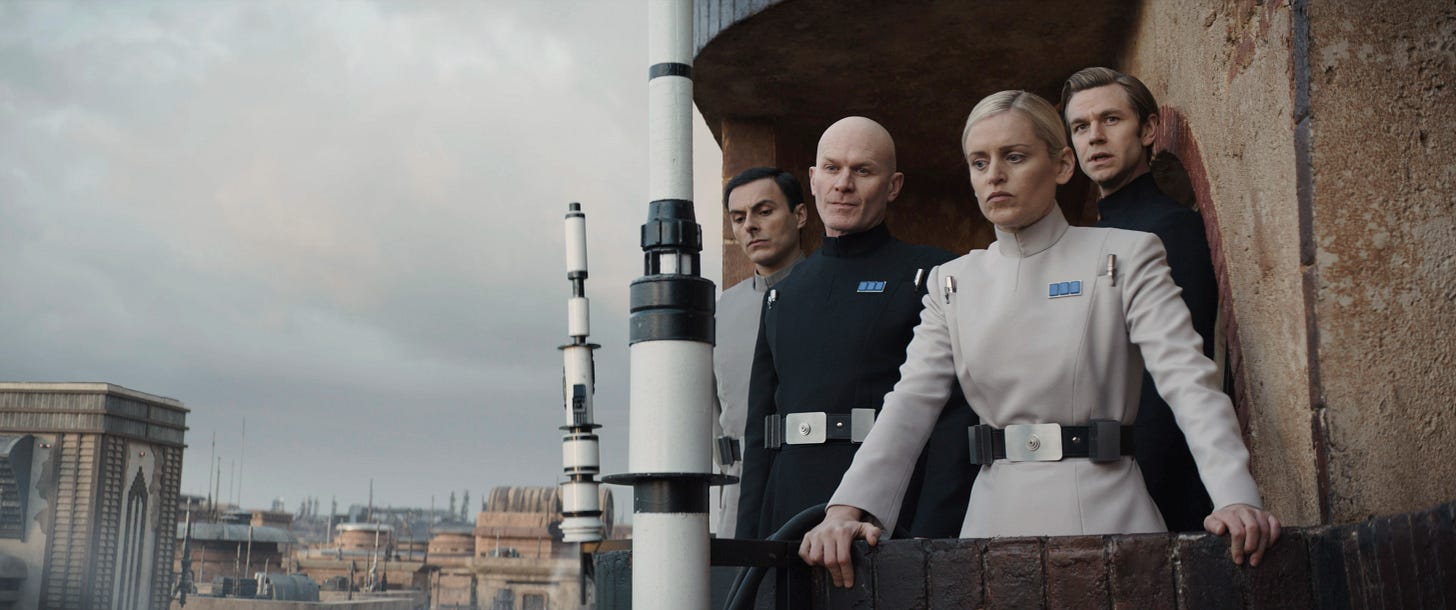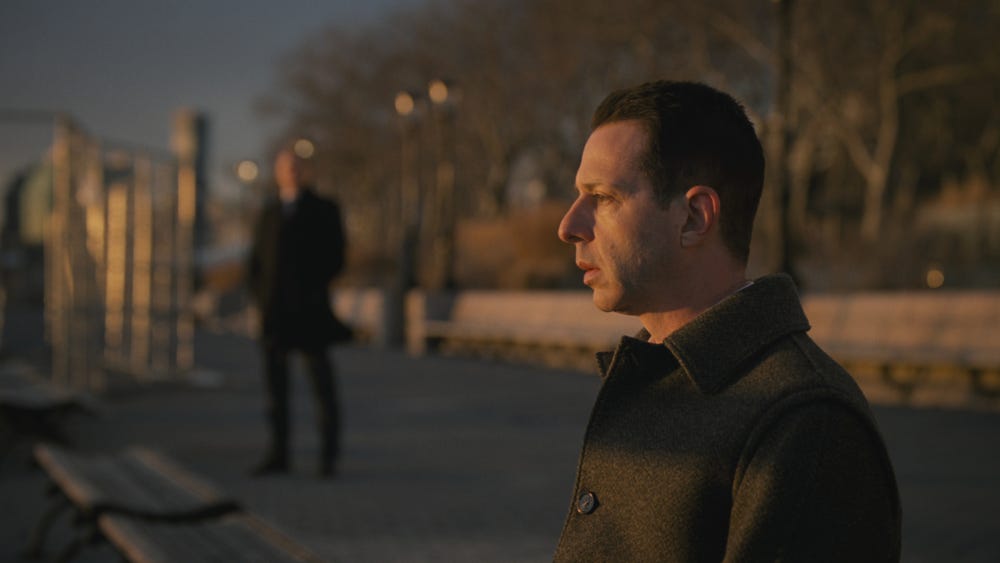Anticipating Shame Is Stopping Us From Enjoying Things (and Making Us Stupider)
People are misunderstanding The White Lotus again in hopes they won't be implicated. But we are implicated.
Okay, so, I’m loathe to report that it’s happening again: people are misunderstanding The White Lotus. It’s part of a large trend of adoptive media illiteracy that flattens stories to make them easier to consume and respond to. In the last decade or so, we’ve become so afraid of being made fools of by evil men that we’re rejecting imperfect, challenging art that may have something to teach us. We’re confusing the artistic employment of evil characters with evil intent and throwing it all out.
So, why are we doing this?
This week, HBO aired the sixth episode of the new White Lotus, but the season’s reviews en papillote have long been served and The New Yorker’s review of season 3 seems to completely misunderstand what the show is about.
In her second review of The White Lotus, Inkoo Kang starts by saying:
Given the number of murders that have taken place at White Lotus resorts since the HBO series began, in 2021, one wonders why visitors continue to flock to them. It’s clear that at least some of the guests at their Thailand property… haven’t done their research…
What follows is a near pan of the season (which is to be expected as the piece is titled ‘“The White Lotus” Overstays Its Welcome’). It may or may not deserve that review, but the constructs of the argument fail to grapple with the work that’s presented.
Never mind there haven’t been any murders on the show (both deaths in previous seasons were literally accidents), the central examination of the artistic project that is The White Lotus is of rich white people viewing themselves as separate from the world, and therefore unable to imagine themselves as potential victims (or even dying). It’s a display of assumed exceptionalism, with each season confronting most of its characters with that lie.
The final lines of Kang’s review are:
No one is in more urgent need of the Buddha’s teachings — “Don’t get attached, don’t have desires, don’t even try” — than a man whose wants have doomed his family. But it doesn’t occur to him that the solution to his distress may be staring him in the face.
She’s pointing out that our favorite money laundering Carolinian, Timothy Ratliff (Jason Isaacs), is in the throes of a mounting crisis that could be solved by studying non-attachment at the Buddhist temple down the street (something he flirts with in the latest episode). She’s remarking how ridiculous it is that he isn’t doing so.
But, that is the point.1
That’s creator Mike White’s message: When rich white people travel, they don’t travel. They receive their resort maps that define the boundaries of their rented, gilded cages. They’re not voyaging to experience a culture or explore the tapestry of the surrounding flora. Their goal is to imprint a lifetime of scenes from a litany of private balconies like one of those red plastic Viewfinder slideshows, clicking through that beach in Hawaii, this hill in Italy, that forest in Thailand, each perfumed by cut fruit and sanitized in the oil that fried their chicken fingers.
It’s to perform comfort and relaxation while snatching a branded polo shirt in the gift shop to flaunt on the golf course for a deliciously jealous colleague at home.
Is this perennial misunderstanding because The White Lotus has the same thesis every season? Maybe the audience has grown tired of the repeated message considering it’s a kind of a quasi-anthology? Unlike American Horror Story and Fargo, the seasons are presented in chronological sequence with the settings and most of the characters trading out. Both Succession and Industry (which Kang loves!) have similar central theses, but those are more linear narratives with wholly recurring casts that invite us to focus on the continuing plot and evolving drama and thematics.
Instead, I think it’s part of a cultural trend that confuses the morality of characters with the message of the work. It’s a trend that conflates creative representation as personal endorsement. Or, as Omar El Akkad describes in his newly published expert deconstruction of the mythology of Western supremacy, One Day, Everyone Will Have Always Been Against This, “…the oft-stated fear that to try to understand something is inseparable from pledging allegiance to it.”
This habit of misunderstanding The White Lotus isn’t new or unique to this show. It’s been around.
When American Psycho by Bret Easton Ellis first came out in 1991, there were routine news cycles about the ethics of the book itself. I was at a talk once where Ellis described a bout of depression in response to reviewers conflating Patrick Bateman’s psychopathy to Ellis’ own. He described critical theorizing that the only way Ellis could write a character as psychopathic as Bateman is if he were a psychopath himself.
Meanwhile, the satirization of the book was also called into question. In a retrospective on the impact of American Psycho, Irvine Welsh2, author of Trainspotting, writes:
I recall, around the time of its publication, having an argument with a female friend about the violence towards women in the novel. She said (and I’ve heard this argument several times): “If you are yourself subjected to the violence and misogyny of the patriarchy, then this text becomes not a criticism of, or satire on, late capitalism, with the abuse of women deployed as a metaphor, but a rendering of that abuse, a public display of it for entertainment.”
These experiences prove that the satire Ellis attempted in the novel did not have a 100% success rate, but neither does any creative project. Novels, movies, TV shows, music, are not algebraic equations. They’re movable, living, interpretable things that may challenge their audience to experience something new.
Certainly, what we bring to a reading of a work shapes the way we experience the work. (Uncomfortable laughs sound the same as jubilant laughs.) And the presentation of a problematic perspective may be imperfect in its effort towards criticism or satire, but that doesn’t mean it isn’t what it is. Among the even semi-media literate, few would say American Psycho is non-critical even if its criticism is imperfect.3
In an era of marketing saturation, intent is easy to discover. Whether found in an interview on some obscure podcast, a creator’s Substack, or Tweet thread, if the audience doesn’t have the media critical curiosity to parse through the work themselves, it’s likely still available. And there are bad actors, to be sure (see: Matt Walsh’s What Is A Woman?) (but, like, don’t actually see that), but if we out source our criticism of complicated work to gatekeepers in declining industries who are more reactive to vociferous minority response rather than evaluation on the merits of potential discourse, we all lose.
In the past few years, I’ve had a sense that we’ve seen an uptick in what I’d describe as “pre cancellation”: essentially a swift reaction to hints of impropriety buried inside work that gets sanitized out before the public can respond (and engage in actual, so called “cancellation”). And with that goes the potential for criticism.4 This sanitization rarely touches the work that’s actually destructive while preventing us from having broader, more complex conversations.
Consider the saga of Keira Drake’s The Continent. Here’s a quick summary if you’re luckily unfamiliar:
A debut author was advanced more than $500k to publish a book rife with white savior narratives, savage dark-skinned natives, and the employment of sexual violence as a first pass power play by indigenous-coded characters. When these storylines hit the public, the response was swift and strong, putting formal publication into question. Drake and her publisher opted to revise the book, compiling a list of critiques, did a slap dash aesthetic edit (changing a few names and rebalancing melanin distribution rather than addressing narrative structure), and published. A sequel is on its way.
The new version of The Continent doesn’t address any of the central issues and instead shuffled some aesthetics. When the white savior is no longer white and the saved are no longer brown is the narrative suddenly righteous? Could there not be a story of a white savior recognizing they made a mistake, repairing the damage caused, all while learning the indigenous social technology is better attuned to the reality of life created under the pressure of a white empire? (Never mind that was almost literally Drake’s lived experience with the saga, and it is what she claims the story was initially conceived to do.)
Race swapping Othello might make for an interesting project for second year Theater students (or Patrick Stewart in 1997, evidently), but it effectively purges the original analysis of racism. Also, Lorraine Hansberry and August Wilson are right there.
Throwing away works like the OG version of The Continent, or HBO’s Confederate, or Underground Airlines5, doesn’t benefit anyone more than throwing away Emilia Pérez or Emmerich’s Stonewall. We don’t know if harm would have come from considering them whole because we weren’t permitted to evaluate them. Some folks heard rumors and created custom boogeymen based on those rumors and called them harm.
Certainly there is a difference between rejecting Charlie Kirk or Steve Bannon, and rejecting a book or show that includes a Steve Bannon-type whose world view gets complicated as part of the narrative (or remains intact as a comment on our current moment).
Pointing and laughing at Walter White and Rick Sanchez and Don Draper for their shitty lives is part of the exercise, even if there are swaths of incels who lionize them. If we arrest these projects in fear that they may be misinterpreted, then maybe we aren’t even ready for a particularly intelligent episode of Bluey.
But there is inherent value in contending with shitty people, even if they don’t get their comeuppance. Watching Andor, arguably the best Star Wars property in existence, includes rooting for Imperial bitch Dedra Meero despite her evil actions, and then sitting with the feeling of having rooted for her after she destroys lives. The project of the prequel trilogy of Star Wars wasn’t to redeem Darth Vader, it was to show the monsters are real people. The project of A Ballad of Songbirds and Snakes wasn’t to empathize us to Hunger Games’ despot President Snow, it was to show that fascists are pathetic little men.
That’s interesting. That’s valuable. But finding ourselves caught in these narrative nets can feel shameful. And we hate to be ashamed. So, instead, we fight them. By completely erasing the possibility of empathizing with a figure who features even a hint of problematics, we avoid shame and maintain the purity of our own perfect judgement and therefore keep a clean conscience.
And this is making us stupider.
In 2025 it’s easy to feel like the #MeToo movement is far in our rearview mirrors, but there was a true social reordering during the first years. Any new headline featuring a famous man came with an expectation of new accusations. The announcement of death was often preferable to an allegation of sexual harassment. There was a tangible grief each time we learned a beloved figure was a sex pest.
Whether it was Louis C. K., who had only just passed the apex of his career, or Kevin Spacey, whose accusations were expected by anyone who knew young gay actors in NYC, LA, or London. The horror of Bill Cosby and R. Kelly. Learning the truth about Harvey Weinstein cast a revolting pale on a long list of beloved films. Neil Gaiman. Entire corridors of culture were suddenly given new contexts. The laughs offered by Scary Movie and the catharsis of American Beauty, the euphoria of “I Believe I Can Fly”, the innocence of Jell-O Jigglers, a bright blue bob from Coraline, all shaded by The Accusations.
And with each progressive uncovering, paranoia increased. Every rumor of borderline behavior became retrospective evidence. Questionable jokes and off-handed remarks became proof that it was “obvious all along.”
“How could we have missed it?” “How could we have been so stupid?”
These were challenging experiences and, as a culture, we worked to turn them into lessons. “Fool me twice, shame on me,” a sentiment we metabolized deeply. Each successive unmasking transformed from a moment of grief into some kind of individual moral, judgement failure. Which may or may not be true, and is completely understandable. But we weren’t stupid. We didn’t miss anything. We were misled. We were lied to.
Of course, we moved to “Believe All Women” and “Stand With The Victims,” each righteous positions. And with that came a reactive decrying of “Cancel Culture,” which is, of course, merely people experiencing the consequences of their actions.
All of this is actually pretty easy to reconcile, especially when you evaluate each situation with a modicum of attention. But we don’t, we’re busy, we’re distracted, we’re heartbroken. So instead, many default to simple, mindless, scripted responses. A flattening of the reality of potential answers: an in-feed post that can be reposted, an easily-memorized response that fits into 140 characters. We’re exhausted, we’re tired of it, and we’re ashamed when we miss it or love something that is attached to an evil man.
So instead, we’ve started to just reject any hint of it. Why grapple with the complicated tension of relating deeply to Harry Potter knowing full well the woman who created him would glee in the annihilation of the world's most vulnerable humans? It’s simpler to watch pimples get popped and choreography repeated.
I say that without irony or cynicism: it is a psychic relief to watch mindless content in a world surrounded by horrors. Of course we would shrug off complexity and discomfort. What a relief. But in doing so, we miss out on the project of engaging with the messy, (sometimes) lovely world we live in.
So how do we distinguish between art that’s doing it intentionally like The White Lotus and Succession, and art that’s failing at it because of the individual creative weaknesses of the artist, like The Continent and The Electric State? Each of us can attune our personal tastes and argue the merits of individual work, and we should. But there’s no solving it. Because the discomfort is the point.
We cannot create an easily replicatable ruler for assessment, and art that deals with unsavory people is meant to needle discomfort. It always has. It feels especially sharp in the last decade with our cascade of reckonings, but that’s because we’re sore. We’re exhausted of it. That’s not the work’s fault, it’s our own fault for demanding the world be simpler to glide through it with less friction, flatter to understand it with shallower analysis.
But we must allow ourselves to attune our own barometers, we cannot always rely on others to make judgements for us. And that guarantees that we will fail. It requires that we will fail and adjust and permit critique of ourselves that we evaluate in good faith, too. It requires that we discuss and argue with people we love, respect, and trust. That’s the work of the audience, to allow these questions to reflect on us. Otherwise it’s just the circuses.
I’m grateful that audiences continue to receive work that complicates these notions, and that sets us up to betray ourselves, mirroring our own poor judgement and luring us to confront our own darkest impulses.
Of course I love Kendall Roy’s apartment in Succession, and imagine what my life would be like living there, knowing full well the only way I’d be able to afford it would be to engage in massive fraud, deceit, and exploitation, like any billionaire. And there’s a moment where I wonder, “Would it be worth it?” Of course not, but that moment of wondering taught me what Succession wanted me to learn.
Because that’s the point.
Participating in art is allowing ourselves to be fooled. That’s the central agreement: suspension of disbelief. It just turns out that sometimes the foolishness also comes from the creators’ actions outside of the work, which sucks but that’s part of the messiness of being human: You must risk being wrong.
It’s a reminder of the discourse around Season 2, some viewers whining, “They’re in Italy! Why aren’t they leaving the resort to eat incredible Italian food?” But, of course, that is the point (as Bon Appétit reminded us at the time).
Not to put too fine a point on it, but Welsh is now a controversial figure and it’s worth pointing out that his support of J. K. Rowling and flippant dehumanization of trans people seriously discredits his own ability to engage with whole-hearted reality.
Though some recent viral, troglodytic analysis of Verhoeven’s Starship Troopers seems to claim the movie fails as satire because… the actors are hot? See also: the 2014 remake of his RoboCop (1987) stripping out much of the criticism of over-policing, theorizing instead that it’s the “Robo” that’s bad, rather than the “Cop”.
In my own search for examples of this, I’ve come up with fewer than I’d hope to make this argument unassailable, so I might ask for some latitude.
Missing out on this work is no great tragedy, either. Their impacts would have likely been negligible, as is the impact of most work.








